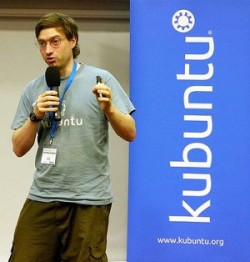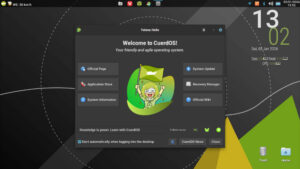FOSS Week in Review
Well, so much for an easy week. I was ready to kick back, give Fedora 22 a further test run and pop open a cold one (root beer, of course) while I wrapped up the week with items like Jim Whitehurst’s busy week which included, among other things, an appearance on CNBC’s “Squawk Box,” a review of Bodhi Linux on about.com, of all places, which I found interesting in a quirky way. And maybe — just maybe — we could all talk about Richard Stallman claiming the OS we all use should be called GNU, oblivious to the fact that this particular train left the station, oh, 20 years ago or thereabout.

The $143,000 question: Softpedia reported earlier this week that there’s a unaccounted-for $143,000 in donations to Ubuntu that the Ubuntu Community Council can’t seem to find. While this doesn’t seem to be a new story, if mailing list traffic is any indication, it is an issue that does pique the interest for — what do you call them again? Oh yeah — answers.
Go ahead and take a look at the numbers on the Ubuntu Community website. What is somewhat interesting is that it appears that Ubuntu may just be a victim of shoddy accounting, though the take on the first six-month period is about three times more than taken in during the next full year, when incidentally they started tracking this.
My hope is that answers will be forthcoming, but that remains to be seen. Also, on the surface, again this seems like bad accounting moreso than anything nefarious. But again, those are answers that are going to have to come from the Ubuntu Community Council.
Bill and Ted seem to be making the best observation of the situation at the moment.
Speaking of strange things being afoot at the Circle K…
Kubuntu ‘Leader’ Gets the Boot: First things first — Kubuntu doesn’t have an official “project leader,” but when someone asks Kubunteros who their leader is, most of them, if not all of them, point to Jonathan Riddell.
According to a story in OMG! Ubuntu!, the Ubuntu Community Council — still looking for that $143,000 or at least trying to account for it — decided it is no longer recognizing Riddell’s de facto leadership of Kubuntu — leadership he says he has never actually claimed.
Nevertheless, the boot comes, of course, with the imprimatur of Mark Shuttleworth himself. Much of this friction stems from a clarification Riddell requested of Canonical’s licensing policies regarding derivative distributions, like — oh, I don’t know, let’s take a wild guess — Kubuntu. Not getting satisfactory answers caused an unfavorable reaction by Riddell which didn’t sit right with some Community Council members.
Arguably, a lack of transparency is nothing new in Ubuntu circles — some accept this as business-as-usual and some have the unmitigated gall to seek more transparency — and the rest of the gory details can be found in the OMG! Ubuntu! article linked above. Also, long-time Kubuntu contributor Scott Kitterman has a significant amount to say about it in a blog item as well.
The funny thing is, the Kubuntu Council unanimously affirmed that Riddell is to remain on the Kubuntu Council, putting the ball back in the Community Council’s proverbial court.
Your move, Community Council.
Meanwhile, I’m out of popcorn.
You can help FOSS Force grow our coverage by making a contribution during our May Pledge Drive. If you enjoyed this article, please help us by making a contribution. Get all of the details on our Indiegogo campaign page.










Both of these are instances we only know about because much of Canonical’s business is conducted in public, for better or worse. In a more typical business, this would all be in-house and few would know the gory details.
The Riddell flap: Shuttleworth is in a postion that requires him to support what is, by all available evidence, a legitimate decision by the people charged with governing the community. If he undercut them, they couldn’t continue in their roles.
“Both of these are instances we only know about because much of Canonical’s business is conducted in public, for better or worse. In a more typical business, this would all be in-house and few would know the gory details.”
I’m not quite sure how this relates to what I wrote. First of all, it’s the Ubuntu Community Council’s issue with the missing funds – funds, let me repeat for those who weren’t paying attention at the outset – were donations. Donations. From the public. Let’s keep that in mind going forward because it will come up again.
“In a more typical business . . .” Clearly, Ubuntu is NOT a typical business and if you are suggesting it’s OK for FOSS communities to lack transparency, then I would have to strongly and completely disagree.
If it was Canonical’s money – and let’s be frank, Mark Shuttleworth probably has $143,000 he can find by going through the cushions on his sofa – it would be a different issue. But let me repeat for those who may not be paying attention – this amount was in donations from the public and, as an aside, is arguably class-action-lawsuit material if a class (e.g., the donors) choose to go that route.
“The Riddell flap: Shuttleworth is in a postion that requires him to support what is, by all available evidence, a legitimate decision by the people charged with governing the community. If he undercut them, they couldn’t continue in their roles.”
Yeah, well, putting aside the fact that Mark Shuttleworth does what he wants regardless of what the community wants or needs, your argument is pretty much a non-sequitur. Shuttleworth could easily say, “Wait a minute here,” but obviously he won’t because Jonathan Riddell has brought up some issues that, as unsavory as they might be, put community and corporate practices in a bad light — issues that haven’t been addressed yet — and as such, appear to be whitewashed by Shuttleworth and the Ubuntu Community Council.
To be fair, the Ubuntu Community Council is in a no-win situation, and it remains to be seen whether they do the right thing or the expedient thing. Shuttleworth is just being Shuttleworth – the “my way or highway” behavior everyone has witnessed for his entire involvement in the FOSS world.
But to say “Shuttleworth is in a position that requires him to support . . .” is pretty funny and completely detached from reality, especially because if anyone can do it, he can do the right thing, address Riddell’s issues, and create a culture of transparency where now one of smoke-and-mirrors exists in the Ubuntu community.
Here’s to hoping Mr. Shuttleworth does what’s right for all parties involved. I happen to like his design ideas on Ubuntu, and I think that this could as stated by the author just be bad accounting. If Mr. Shuttlework can write a chceck for $143K to avoid such mishaps, I’m sure he would have done so already. Better to let the investigation take place and find out exactly what’s going on behind the curtains….no?
They need to clarify all the situation. Isn’t a good thing to have some secret.
but obviously he won’t because Jonathan Riddell has brought up some issues that, as unsavory as they might be, put community and corporate practices in a bad light — issues that haven’t been addressed yet — and as such, appear to be whitewashed by Shuttleworth and the Ubuntu Community Council.
This is about right. Its always easier to shoot the messenger.
The thing is that Canonical has so often over the past few years managed to screw up its relationship with other communities that I find it simply amazing that a company could be so incompetent ESPECIALLY since they pride themselves about how they are the kings of the community racket. Of course, if they arent that incompent it could be they just dont give a f^^^ about anyone else and will do whats best for them. Its their right after all. It just makes a total joke about their vaunted talents are herder of people.
When I started reading up on this, I didnt even blink because it was Ubuntu and thats ‘just the way they are’ which is what you say about old senile uncle Doug who farts at the dinner table. Weve come to expect this from them.
i will leave the missing money on the side for now but Im sure JRidell was curious about this too but from all ive read Ridell and others have been asking clarifications from Canonical for 2.5yrs (some say up to 4yrs).
Now if someone asks me for some info and after 2-4yrs I havent YET had the common courtesy to give an answer, if is TOTALLY NORMAL to start wondering why that is.
Busy? Could. Although 2-4yrs seems like one crazy lifestyle to lead where you dont have the time to address a FUNDAMENTAL ISSUE of free software.
But I shouldnt be surprised if some people start wondering if there are other reasons I REFUSE to answer. The first thing someone will wonder is “What is he hiding?” which is a normal reaction.
Of course asking this question is a show of bad faith is seems because the thought police wants you to only assume good faith from others because its a kumbaya world we live in like some old disney cartoon. Having doubts about motives means THAT YOU are the bad person.
Of course kicking out someone who might have these thoughts only reinforces these beliefs that there WAS something fishy going on and the expulsion confirms it.
If you cant understand how 2-4yrs of being ignored can lead someone to have ‘bad thoughts’ about intentions, then you are willfully ignorant. If you cant see how kicking someone out only confirms it, then just go back to your Disney world.
So its either:
A too busy for 4yrs,
B hiding something
C not giving a f***
One of these three reasons explains Canonical reasons for their 2-4yr gestation period.
Feel free to believe whichever one of these you want.
Some will choose to believe that Canonical has pushed their emulation of Apple. You can take the intention from this that you want.
I don’t want to stir the pot, but if I donate (not purchase) to Ubuntu, is Canonical obligated to give me a breakdown of where the funds go? So yeah I don’t see a class action anything happening. Let’s be realistic.
Certainly, internally the situation has to be sorted out thoughtfully but non-associates aren’t owed anything.
Perhaps I’m too dumb to see all the ramifications, but what I have been able to put together over the years is this.
Jonathan Riddell has been the one person to bring more than a semblance of unity, class, and stability to a version of Ubuntu; three qualities which Mark Shuttleworth has worked very hard to not achieve with any other major Ubuntu offering. Indeed, Mark Shuttleworh can be credited with causing nothing but division within entire the Linux community, and for a very long time.
Of course someone whose core values are this much at odds with the Self-Appointed-Benevolent-Cult-Dictator-For-Life cannot continue to be tolerated; PARTICULARLY someone as self-effacing as Jonathan, AND who heads up what most agree is the best KDE Linux available, anywhere.
Ununtu’s “governance mechanisms” have always been a joke. There exists only one: SABCDFL. Canonical is only a shell for Shuttleworth to use as a buffer, and to–transparently–use as an excuse.
So what’s Jonathan Riddell’s optioN?
Simple.
Do a “Mint Linux”.
Simply disassociate himself completely from Ubuntu, and–based on FOSS licensing–use each new Ubuntu LTS as the basis of HIS hard work, continuing to release the best possible KDE Linux.
You heard it here first, Jonathan: LinuxKDE.
Crap on the totally effete Ubuntu Community Council AND Mark Shuttleworth.
First to the comment that “Both of these are instances we only know about because much of Canonical’s business is conducted in public”, is so not true. Riddell being booted off the board was done in a secret back room meeting.After not being able to get anywhere with this, the Kubuntu team, seeking transparency released all of the correspondence. Part of not getting anywhere is Kubuntu waiting for the minutes of the secret meeting, irc conversations, etc and proof of any actual instances where Riddell actually violated the code of conduct”.
Secondly. At least in the US there are laws about how donations are handled. Ubuntu had it set up where you could target where you donation went. It is inexcusable that any club, organization, church or business could mess up that accounting like this. The big stink is a good portion of that $143,000 was money people designated for “Kubuntu/Xubuntu/Lubuntu”. Plenty of people involved in Kubuntu want to know where the money they donated went to. Because at this point, it does not look like those targeted funds went back to they baby buntus.
Thirdly. The Ubuntu Community Council is a puppet organization set up by Mark Shuttleworth. It is packed with Canonical Employees. In any situation that is Canonical vs Community, Cannonical will always win. They have more votes on the council. Ultimately those who vote and work for Canonical would find that if they vote the wrong way, they may no longer have a job.
Mark has always done a great job of building community and talking community. Right up till when he moved the buttons from the top right to the top left of the title bar. When the community voted to move them back, Mark told the community how it really was. He listens to their input but ultimately he makes the decisions. “Community” is an illusion to get people to give away Ubuntu CDs, and man the forums, IRC and write blog posts about how great Ubuntu is.
Understand. Mark owns Canonical. They operate at a loss, every year he puts his own money in to keep thing going. If I was him, I would feel I have the right to make whatever decisions I want. I just find it disingenuous to keep telling us all how Ubuntu is all about a democratic community.